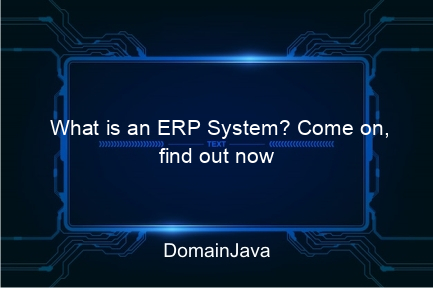What is an ERP System? Come on, find out now – ERP systems may sound complicated and technical, but this concept is actually very important in the business world. By understanding ERP systems, we can see how large companies keep their operations efficient and organized.
Come on, read this article to understand more deeply about what an ERP system is, its benefits, and how to implement it in a company. Guaranteed, after reading this article, you will understand more about the importance of ERP systems in the business world.
What is an ERP System?
ERP, or Enterprise Resource Planning, is a system that integrates various business processes in a company. With ERP, various departments in a company can communicate and share data more efficiently.
This system usually consists of various modules that cover various business functions such as accounting, inventory management, sales, and many more. By using ERP, companies can manage their resources better and optimize daily operations.
Simply put, an ERP system is the backbone that keeps all aspects of a business running smoothly. From production to delivery, everything can be managed in one integrated platform.
Benefits and Advantages of ERP Systems
Implementing an ERP system in a company brings many benefits. The following are some of the main benefits that companies can experience:
Main Benefits of ERP Systems
| No | Benefit | Description |
|---|---|---|
| 1 | Data Integration | ERP allows data integration from various departments, making it easier to make decisions based on accurate data. |
| 2 | Operational Efficiency | With automated and integrated processes, companies can reduce manual errors and increase operational efficiency. |
| 3 | Scalability | ERP systems allow companies to grow and develop without having to worry about system limitations. |
With these three benefits, ERP systems can help companies achieve better performance and be more competitive in the market.
Implementation of ERP Systems in Companies
The process of implementing an ERP system in a company can be a challenge in itself. It requires careful planning and proper execution for successful implementation.
The first step in ERP implementation is to conduct a needs analysis. Companies must understand what their needs are and how ERP can meet these needs. After that, the company can choose the appropriate ERP vendor.
After selecting a vendor, the next stage is to configure and adjust the system according to the company’s needs. This process can take time, but is very important to ensure the ERP works optimally.
Uses and Process of Implementing ERP Systems
The main use of an ERP system is to integrate all business processes in one platform. This allows companies to work more efficiently and be responsive to market changes.
The ERP system implementation process involves several stages, starting from planning, vendor selection, configuration, user training, to go-live and maintenance. Each stage requires active involvement from all parties in the company.
User training is one of the crucial stages in ERP implementation. Without adequate training, users may have difficulty using the new system, which could hamper company operations.
The Role of ERP Systems in Increasing Productivity
One of the main roles of an ERP system is to increase company productivity. With ERP, business processes become more structured and integrated, thereby minimizing wasted time and increasing work efficiency.
ERP systems also help in making faster and more accurate decisions. With centralized and real-time data, management can make decisions based on accurate and up-to-date information.
In addition, ERP allows companies to be more flexible in responding to market changes. With an integrated system, companies can adapt more quickly to changing market needs.
FAQ about ERP System
1. What Modules Are in the ERP System?
ERP systems have various modules that cover important functions in business, such as accounting, inventory management, sales, purchasing, human resources, and production. Each of these modules is integrated with each other, allowing data to flow smoothly between departments.
2. How ERP Systems Help Improve Operational Efficiency?
ERP systems increase operational efficiency by automating previously manual business processes, reducing human error, and ensuring that data is always up-to-date and can be accessed in real-time. This helps save time and costs, and increases productivity.
3. What are the Biggest Challenges in Implementing an ERP System?
One of the biggest challenges in implementing an ERP system is the cost and time required. This process can take months to years, depending on the size and complexity of the company. In addition, user training and system customization also require special attention.
4. How to Choose the Right ERP Vendor?
Choosing the right ERP vendor requires in-depth research. Companies should consider the vendor’s reputation, system features and flexibility, technical support provided, and total cost of ownership. Conducting demos and talking to references from vendors can also help in decision making.
5. Is the ERP System Suitable for Small Companies?
Yes, ERP systems are also suitable for small companies. Many ERP vendors offer small-scale solutions that can be tailored to the needs of small businesses. With ERP, small companies can enjoy the same benefits as large companies, such as operational efficiency and better data management.
Conclusion
ERP systems are a very useful solution for companies to integrate and manage various business processes on one platform. With ERP, companies can increase operational efficiency, reduce manual errors, and make better decisions based on real-time data. The implementation process is challenging, but the results are well worth the effort.
For companies that want to remain competitive in an ever-changing market, an ERP system is an invaluable investment. With various flexible and integrated modules, ERP systems help companies to grow and develop better. So, there’s no harm in starting to consider using an ERP system in your company.
